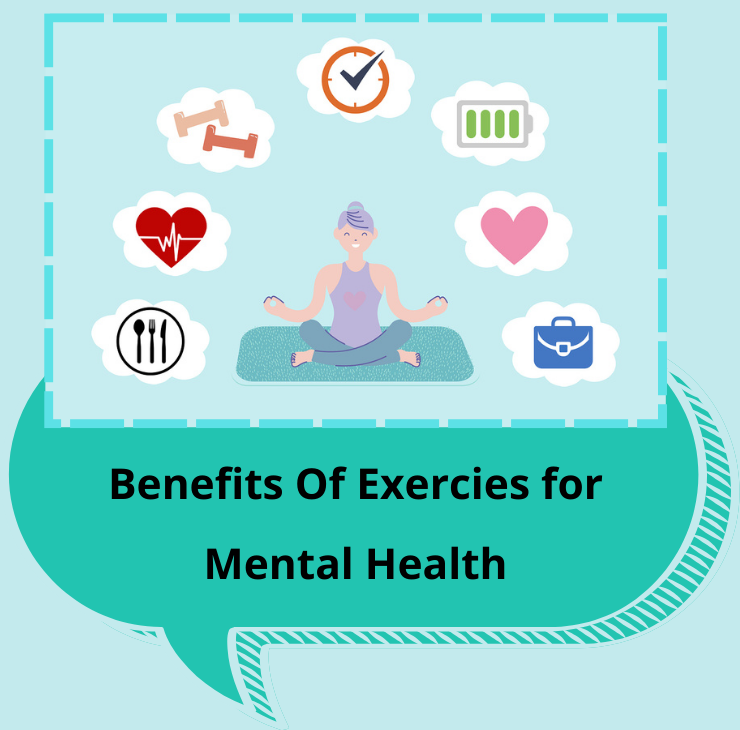Have you ever felt like a new person after a good workout? It’s not a coincidence! The benefits of exercise for mental health go far beyond building muscles—it’s also a key to improving your mood and mental well-being. From elevating happiness to enhancing focus, the proven advantages of staying active are truly remarkable. Want to learn more? Let’s explore how moving your body can light up your mind—one sweat session at a time.
The Science Behind the Benefits of Exercise for Mental Health
 Discover how physical activity transforms your body and mind, unlocking amazing mental health benefits.
Discover how physical activity transforms your body and mind, unlocking amazing mental health benefits.
How Exercise Affects Brain Function and Mood
Have you heard of endorphins? These natural chemicals make us feel happy when we exercise. They are just one reason behind the benefits of exercise for mental healthmental health. When you add serotonin and dopamine to the mix, you get an instant mood boost! Studies show that regular exercise increases these feel-good chemicals, reducing stress, improving focus, and increasing happiness.
The Role of Exercise in Reducing Stress and Anxiety
Imagine being able to kick all your stress to the curb—exercise can do just that! This is one of the most valuable benefits of exercise for mental health. Activities like yoga, walking, or dancing help lower cortisol, the stress hormone, and calm your nervous system, transforming stress into relaxation.
Key Benefits of Exercise for Mental Health
Exercise as a Natural Antidepressant
Did you know that exercise for mental health include acting as a natural antidepressant? Regular physical activity increases blood flow to the brain, boosting proteins that enhance brain function and elevate mood. If you’re feeling down, try going for a quick walk instead of staying on the couch—your mind will thank you.
Improved Cognitive Function and Focus
Struggling to concentrate or stay organized? One of the incredible benefits of exercise for mental health is improved focus and clarity. Activities like running, cycling, or brisk walking enhance memory, spark creativity, and boost productivity by increasing blood flow to the brain.
Better Sleep and Relief from Insomnia
Having trouble sleeping? One of the lesser-known benefits of exercise for mental health is better sleep. Regular exercise regulates your daily rhythm and promotes deeper, more restful sleep. Just avoid exercising too late in the evening to ensure you wind down properly.
How Different Types of Exercise Enhance Mental Health
 Exercise doesn’t just build a stronger body—it builds a healthier mind, too. Let’s us exploring the different types of workouts.
Exercise doesn’t just build a stronger body—it builds a healthier mind, too. Let’s us exploring the different types of workouts.
Aerobic Exercise for a Happier Mind
Aerobic exercises like running, swimming, or dancing release brain-boosting the mental health, improving mood and energy levels.
Strength Training for Confidence and Emotional Resilience
Lifting weights isn’t just about physical strength—it’s about emotional strength, too. One of the empowering benefits of exercise for mental health is how strength training boosts self-confidence and resilience.
Mind-Body Practices: Yoga and Meditation
Yoga is a powerful practice that combines movement and mindfulness. As reduces stress, alleviates anxietyanxiety, and promotes relaxation.
How to Incorporate the Exercise for Mental Health into Your Routine
Incorporating exercise into your daily life can transform your mental health. Here’s how to get started:
Start Small: Not ready for intense workouts? Start with light activities like a 10-minute walk or morning stretches.
Stick to a Routine: Choose activities you love and make them part of your schedule. Think of it as a valuable appointment with yourself.
Overcome Common Barriers: Too busy or tired to exercise? Even short bursts of movement count. Use home workouts, turn chores into fitness moments, or find ways to stay active during the workday to enjoy the benefits of exercise for mental health.
Frequently Asked Questions
How much exercise is needed to see mental health benefits?
Experts recommend at least 150 minutes of moderate exercise per week. That’s just 30 minutes a day, five days a week, to start reaping the benefits of exercise for mental health.
What’s the best type of exercise for stress relief?
Yoga and walking are excellent options for stress relief, but the best exercise is the one you enjoy. From Zumba to solo runs.
Can exercise help with severe mental health conditions?
While exercise isn’t a standalone treatment, it can complement professional care for conditions like depression or anxiety. Consult your healthcare provider to incorporate the exercise for mental health into your plan.
Take the First Step Toward Experiencing the Exercise for Mental Health
Exercise isn’t just about looking good—it’s about feeling great, inside and out. Whether you’re new to fitness or a seasoned gym-goer, the benefits of exercise for mental health are within your reach. Lace up your sneakers and take the first step today. Your mind will thank you!
Ready to get started? Check out our beginner’s fitness guide and discover workouts tailored to boost your mental and physical health. Let’s move toward a healthier mind—one step at a time!
